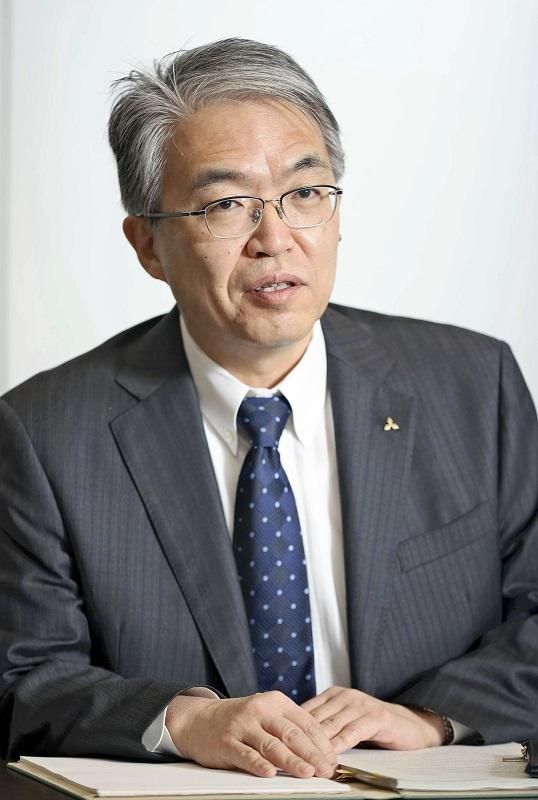18:45 JST, April 5, 2021
As part of a series examining the business and future prospects of Mitsubishi Heavy Industries, The Yomiuri Shimbun interviewed key figures in the group about the challenges their businesses face and their strategies to deal with them. The following are excerpts from the first interview, with MHI’s Chief Strategic Officer Hitoshi Kaguchi.
Mitsubishi Heavy Industries has many mature businesses. For the past five to 10 years, we’ve been asked, “What’s the company’s next growth strategy?” Around 2018, we started seriously considering a possible grim future for thermal power generation [which emits a lot of carbon dioxide].
In the business plan for fiscal 2021-23, which was announced in October last year, Mitsubishi Heavy identified “energy transition” as the engine of its growth strategy. The plan was initially scheduled to be announced in May, but this was brought forward at the direction of President Seiji Izumisawa. We intended to send a message to our employees that we are going to change as soon as possible.
We haven’t written down any details for the plan, so we hope to provide specific content and numerical values [targets] by this summer.
We see the transition to a decarbonized society not as a headwind, but as an opportunity to expand our business.
Mitsubishi Heavy is a leader in technology to absorb carbon dioxide emitted from thermal power plants and other sources. By 2025, we expect to have technology to generate electricity using only hydrogen as fuel.
The past 10 years have seen a great deal of change in society through the use of information technology. This is not the firm’s area of expertise.
To achieve carbon neutral production [to reduce carbon dioxide emissions to net zero], certain “items” will be needed, such as power generation equipment. This is an opportunity to reevaluate the manufacturing industry, not just the heavy industries.
There are many things the Mitsubishi Heavy Industries Group can do. Competition is fierce [in the environmental field], but we must protect employment and safeguard Japan.
Another pillar of our growth strategy is “mobility and other new fields.” We’ll consider what is necessary to realize an automated driving society.
Last autumn, Mitsubishi Heavy announced it would shelve its SpaceJet commercial jet development program, a domestically produced jet airliner. We haven’t terminated the program, but we’re considering whether to take a step forward [when the market recovers]. We wanted to give the impression that we’re still breathing.

Hitoshi Kaguchi
orn in Okayama Prefecture, Kaguchi joined the company after finishing graduate school at the University of Tokyo. He has extensive experience in the nuclear power business and was in charge of designing new reactors. Kaguchi has been the managing executive officer and chief strategy officer since April 2020. He is scheduled to be appointed as representative director in June.
Top Articles in Business
-

Prudential Life Insurance Plans to Fully Compensate for Damages Caused by Fraudulent Actions Without Waiting for Third-Party Committee Review
-

Narita Airport, Startup in Japan Demonstrate Machine to Compress Clothes for Tourists to Prevent People from Abandoning Suitcases
-

Japan, U.S. Name 3 Inaugural Investment Projects; Reached Agreement After Considerable Difficulty
-

Toyota Motor Group Firm to Sell Clean Energy Greenhouses for Strawberries
-

SoftBank Launches AI Service for Call Centers That Converts Harsh Customer Voices into Softer Voices
JN ACCESS RANKING
-

Japan PM Takaichi’s Cabinet Resigns en Masse
-

Japan Institute to Use Domestic Commercial Optical Lattice Clock to Set Japan Standard Time
-

Israeli Ambassador to Japan Speaks about Japan’s Role in the Reconstruction of Gaza
-

Man Infected with Measles Reportedly Dined at Restaurant in Tokyo Station
-

Videos Plagiarized, Reposted with False Subtitles Claiming ‘Ryukyu Belongs to China’; Anti-China False Information Also Posted in Japan























